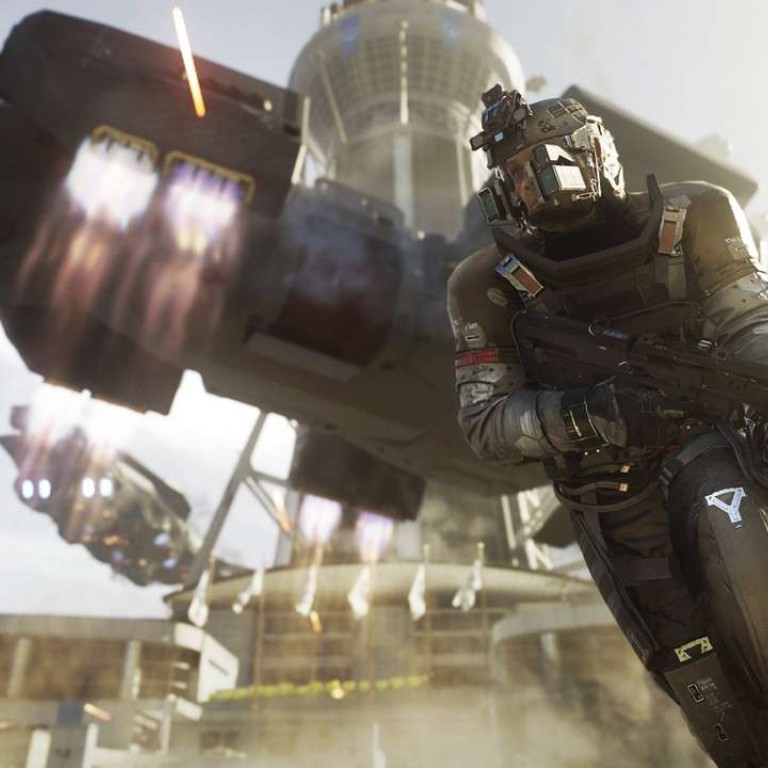
Game review: Call of Duty: Infinite Warfare– fun and fast, but a wasted opportunity
The latest CoD is a case of same-old, same-old: heavily directed combat in long corridors of choreographed and sometimes silly action – even if that action is slick and spectacular
Infinity Ward
3.5/5 stars
In the moments that Call of Duty: Infinite Warfare (for PC, PlayStation 4 and Xbox One) has the courage of its convictions, when its various systems synchronise sufficiently, we get a tantalising taste of its true potential.
These moments usually come when the protagonist, Nick Reyes, leaves terra firma and zips about in zero gravity, using boosters to fly and engaging enemy soldiers against the backdrop of gargantuan spaceships smashing into one another. In between precision shots from his Ghostbusters-like energy weapon, he grapples on to a grunt and pulls the pin on his grenade before kicking him towards two buddies, who look on helplessly as he greets them with an explosion. That taken care of, Reyes grapples to his waiting Jackal space fighter and boosts off to begin dogfighting with enemy craft.
Call of Duty’s production values ensure such episodes look spectacular. They may not be perfect in execution – rotation can become disorientating and enemy AI remains erratic – but they at least attempt to jolt this long-running series off its sometimes derided rails.
Disappointingly though, Infinity Ward’s latest offering is mostly the familiar CoD routine of boots-on-the-ground combat in long corridors of choreographed action. It’s just that here, those boots are rocket-boosted and able to run up walls. Even this concept is a pale imitation of Titanfall at its finest, boasting similar fundamentals but not the conviction to make them integral. While traversing these familiar sci-fi environments – futuristic cityscape, ice planet, rock planet, space station – parkour is mostly unnecessary.
How bestselling video game Call of Duty got a sci-fi makeover and left earth
The old problem of this game’s key narrative delivery technique remains: you have to follow computer-controlled characters who yell orders and exposition at you, but often they move too slow and it gets frustrating. The sheer number of times the game strips control away from you remains extraordinary – after a while, even the most impressive cinematic moments become a deadening intrusion. The first time you’re blasted out of an airlock it’s inarguably impressive and it even feels appropriate that you’re helpless. The second time is simply irritating. The third time, you just want to drift away forever like Frank Poole in 2001: A Space Odyssey.
But even in space, you lack freedom. Attempts to outflank the enemy are thwarted by a curt prompt to return to the “combat zone” or be booted. The space craft combat sequences are a mess. The physics lack heft and movement feels erratic. Opposing fighters are simple to lock on to but the game then wrests control away to track them. Occasionally, when you kill an enemy, a playing card will pop up to tell you he was a big cheese, but since you only find this out after killing them it renders the whole scheme somewhat pointless. You shot them just the same as all the others; that’s what you do in CoD.

Much is made of the fact you’re a captain but you can’t issue orders in the field and, despite a Mass Effect-like galaxy map to navigate on your ship’s bridge, you cannot shape the campaign’s outcome. You can select two types of side mission – ship infiltration or ship-to-ship combat – but the benefit of them is merely upgraded equipment. It’s certainly no Mass Effect in this respect – and while that comparison is harsh, it’s conditioned by the developer’s obvious desire for you to care about your mission and crew; the message about prioritising one over the other is crowbarred into every conversation.
The online multiplayer modes are the best thing. The campaign’s traversal mechanics come out of hiding and the wealth of options become apparent. Whether you’re angling for a nuts and bolts death match on a lunch break or something more substantial, CoD remains a slick and intuitive shooter that sucks you in and keeps you there. The ready-built combat rigs cater to different play styles so you can instantly pick the right load-out, whether you like to snipe or stab.
Five years on, Call of Duty fan convention is returning
For the first time there’s weapon crafting, too, and a conscious effort to reward players for attempting different match-types, not to mention a neat 1980s theme park reboot of zombie survival. Prototype weapons are the strongest in the game – graded from common to epic – and you obtain them by earning salvage as you play or by completing challenges with one of four mission teams. The holy grail is a gun that provides a nuclear blast if you can string together 25 kills.
Crucially, such objectives are optional and there’s no chance of the camera being yanked away as you complete them. Infinite Warfare improves online because the game doesn’t dictate you experience events precisely as the developers intended. In many ways, the campaign feels like a wrestling match between your game and theirs, perhaps a mirroring of their attempt to innovate within the constraints of the CoD franchise behemoth.
But this doesn’t excuse a forgettable plot or fighting that’s inferior than its triple-A peers. Infinite Warfare could have been much more than a passable single-player movie attached to a super fast, super confident multiplayer infrastructure. As such, and with those moments of tantalising potential in mind, it feels like a wasted opportunity.

